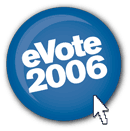
|
eVote 2006: Questions & Answers | Electronic voting | Council meeting summary |
Q & As
Questions and answers
Question: How do I know if I am eligible to stand for election for the College Council?
Answer: If you are a member in good standing of the College, reside in Ontario and are prepared to meet the specific eligibility requirements for the position, you are eligible to run.
Q: Are there exceptions?
A: Yes. Employees of the Ontario College of Teachers are not eligible to stand for nomination.
Q: What if I am a College member in good standing and I am retired or teach occasionally?
A: You are eligible to seek nomination for one of the regional positions open to both part- and full-time classroom teachers if you are prepared to be employed as a member of a regular teaching staff on a part-time basis or as an occasional teacher and teach a minimum of 10 days annually.
Q: Some positions are open only to full-time classroom teachers. How are part-time and full-time defined?
A: A full-time teacher is one who is employed as part of an employer’s regular teaching staff and who is assigned in a regular timetable to provide instruction to elementary and secondary school students on a full-time basis. A College member who would otherwise be a full-time classroom teacher but who is on parental, sick, family or compassionate leave is considered a full-time teacher.
A part-time teacher is one who is employed as part of an employer’s regular teaching staff and assigned in a regular timetable to provide instruction to elementary and secondary school students on less than a full-time basis or to teach on an occasional basis. A College member who would otherwise be a part-time classroom teacher but who is on parental, sick, family or compassionate leave is considered a part-time teacher.
Part-time teachers must teach a minimum of 10 days per year during their term on Council.
Q: I am on negotiated leave. Can I run for election?
A: No. Only those on parental, sick, family or compassionate leave are eligible to run. No other leaves – like four-over-fives or educational leaves – qualify.
Q: What about people like teacher-librarians, guidance counsellors, consultants and other members of the College who are employed full-time or part-time? Are they eligible to stand for election?
A: They are considered classroom teachers and are eligible to run for positions open to those who are full-time or part-time classroom teachers.
Q: How do I get nominated?
A: If you wish to be a candidate for a position, you must send or deliver a completed nomination form to the Registrar by 5 PM on July 14, 2006. A copy of the nomination form is available on the College web site or by mail. Nomination forms are not accepted by fax.
You will need the signatures of at least 10 College members who are eligible, at the time of signing, to run for the position you are seeking and who have not signed the nomination form of anyone else for the same position.
Q: Can I run for more than one position?
A: No. You can stand for nomination as a candidate for only one position.
Q: When will I know if I have been confirmed as a candidate?
A: Once received, your nomination will be reviewed and you will be advised in writing as to whether your nomination meets the necessary requirements for candidacy.
Q: What is the time commitment for Council members?
A: The Council serves as the College’s board of directors and is responsible for setting policy directions for the College. Council members attend a minimum of four Council meetings a year.
Members also serve on a minimum of two of the Council’s statutory, standing or special committees. Committee chairs usually have additional responsibilities. Council members will require a minimum of 30 days’ leave per school year.
Q: How are elected Council members compensated?
A: If you are an elected Council member and you attend a Council or committee meeting, the College will reimburse your employer for salary expenses incurred in the hiring of a temporary replacement.
In addition, the College reimburses members for expenses incurred while on College-related business. Elected members also receive an honorarium for meetings that take place during a vacation period.
Q: How long is the term of office?
A: The term of office for the fourth Council runs until June 30, 2009. A Council member may serve two consecutive terms.
Q: When would I assume responsibilities as a Council member?
A: If elected in October 2006, you would take office at the first meeting of the new Council on November 9. You will be expected to participate in a two-day orientation session on November 2 and 3, 2006.
Q: How can I get further information as a potential candidate?
A: If you are thinking about seeking a Council position and have more questions, please contact the College at 416-961-8800 or toll-free in Ontario at 1-888-534-2222, ext 559 or via e-mail at evote2006@oct.ca.
Q: As an official nominee, can I circulate campaign information through the College?
A: The College will make available opportunities for nominees to communicate with voters. Nominees are required by regulation to submit biographical information that will appear in the September issue of Professionally Speaking and on the College web site. Full details will be included in each candidate’s information package. All candidate information will be available in English and French.
Q: If I’m elected in a region and move during my term, can I continue to serve on the Council?
A: No. If you move out of the region or change your employment so that you no longer meet the eligibility requirements for the position, you must resign. The person who finished second in voting for that category would be asked to fill the position, provided they still meet the eligibility requirements.








